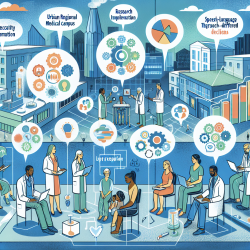Introduction
As a practitioner in the field of speech-language pathology, staying informed about the latest research and data-driven strategies is crucial for enhancing service delivery and outcomes for children. One such insightful study is the "Impact of an urban regional medical campus: perceptions of community stakeholders" which evaluates the socio-economic and healthcare benefits of establishing a regional medical campus (RMC) in an urban setting.
Key Findings from the Study
The study consulted 23 community stakeholders from various sectors, including healthcare, education, business, and government. Thematic analysis revealed several positive impacts of the Windsor Regional Medical Campus (WRMC) on the community, which can be valuable for practitioners aiming to improve their skills and services. Here are the key findings:
- Improved Healthcare: The presence of the WRMC has significantly mitigated physician shortages, enhancing the standard of healthcare. Practitioners can leverage this model to advocate for better healthcare resources in their communities.
- Enhanced Community Reputation: The WRMC has boosted community pride and optimism. Practitioners can engage in community outreach to further enhance their reputation and build stronger community ties.
- Stimulated Economic and Community Development: The WRMC has driven investment in healthcare and business innovation. Practitioners can collaborate with local businesses and stakeholders to develop innovative therapy programs and services.
- Expanded Training Opportunities: The WRMC has facilitated interdisciplinary training, improving patient outcomes. Practitioners should seek interdisciplinary collaboration to enhance their skill sets and service delivery.
- Community Engagement: High community engagement with the WRMC suggests that transparent communication and public involvement are critical. Practitioners should prioritize clear communication and community involvement in their practice.
Implementing Research Outcomes in Practice
Practitioners can implement the insights from this study to improve their skills and outcomes for children by:
- Advocating for Resources: Use the study's findings to advocate for more resources and support for speech-language pathology services in your community.
- Building Community Partnerships: Engage with local schools, healthcare providers, and businesses to create a supportive network for therapy services.
- Fostering Interdisciplinary Collaboration: Collaborate with other healthcare professionals to provide comprehensive care and improve patient outcomes.
- Enhancing Communication: Maintain transparent and consistent communication with community stakeholders to build trust and support for your services.
Encouraging Further Research
The positive outcomes observed in the WRMC study highlight the importance of continuous research and evaluation. Practitioners are encouraged to conduct further research in their own communities to identify specific needs and tailor their services accordingly.
To read the original research paper, please follow this link: Impact of an urban regional medical campus: perceptions of community stakeholders.










